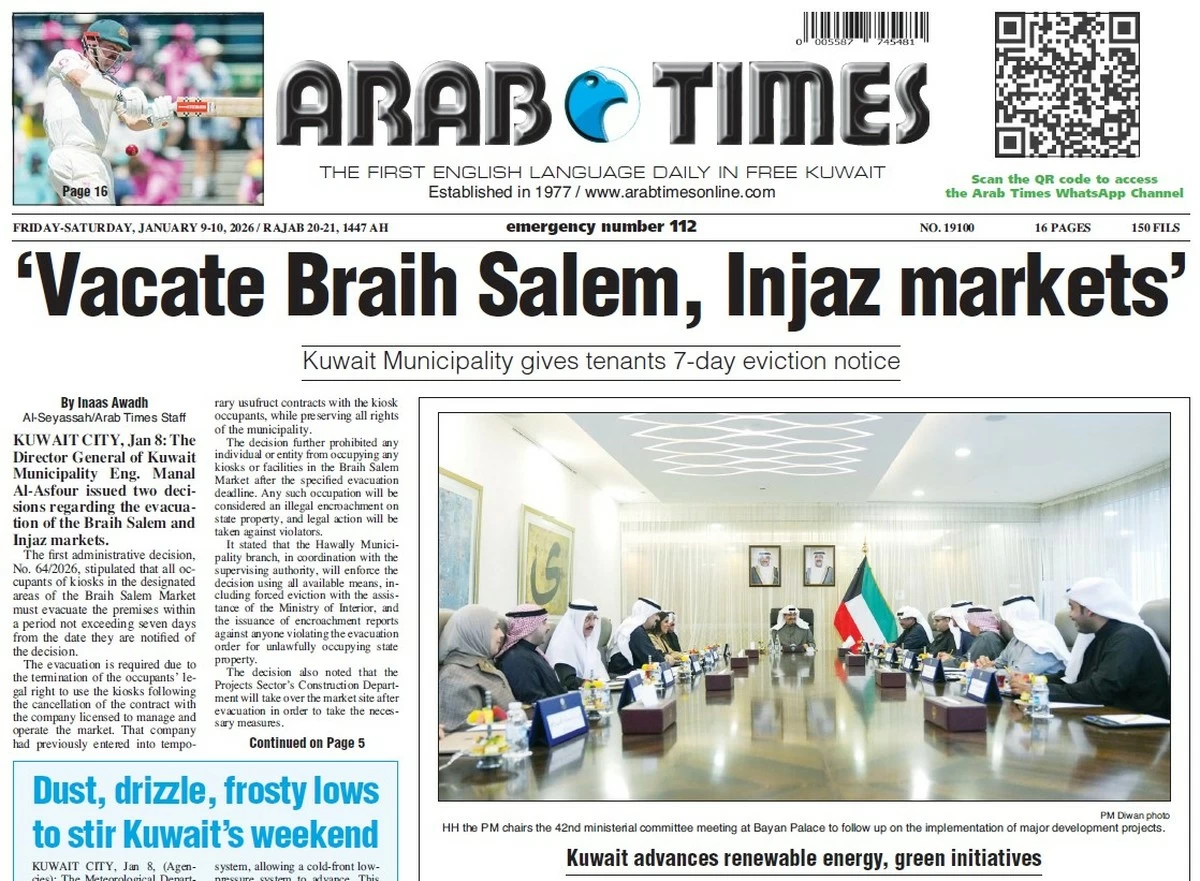Seaside chalets sparkle under the Eid sun.
KUWAIT CITY, June 5: The five-day Eid Al-Adha holiday has become an opportunity for families to enjoy a relaxing time, away from the pressures of daily life. Almost everyone has resorted to chalets as a haven and the first and most attractive option, especially given the seaside atmosphere they offer amid the intense heat, as well as the comprehensive entertainment services, at a time when traveling outside the country is not feasible for many. In this context, several reservation office workers confirmed to the newspaper that chalets in Sabah Al- Ahmad Sea City witnessed a high demand and a remarkable increase in prices -- about 60 percent higher compared to normal days.
This price hike is due to the increased demand during the Eid holiday, which some consider an unjustified increase. They revealed that the rent for ‘deluxe’ chalets -- consisting of four rooms and a swimming pool, and located on the second row from the sea -- reached about KD500 during the holiday, while the rent for those on the first row from the sea (on the creek) ranged between KD600 and KD800. They said the rent for ‘super deluxe’ chalets on the first row of the creek ranged from KD900 to KD1,800; while prices for VIP chalets (which consist of 10 to 14 rooms in modern buildings, with indoor and outdoor swimming pools, and game rooms for adults and children) reached between KD1,800 and KD2,500.
They added that all these chalets are fully booked days before the holiday. They pointed out that the significant increase in bookings coincided with the school holidays and Eid Al-Adha. “The long holiday was expected to encourage many to travel, but the reality proved otherwise, contributing to a surge in domestic bookings,” they added. They also indicated that occupancy rates reached nearly 100 percent in most locations, especially in Sabah Al-Ahmad Sea City, which has become a major destination for short vacations and special occasions. The heightened activity is not limited to chalets, as it extended to coastal hotels and resorts, where the price of a single room per night ranged between KD100 and KD140; while hotel suites reached about KD400 for two nights during the weekend.
They reported that the majority of the tenants prefer chalets with a direct sea view, a private pool, daily housekeeping, and proximity to public amenities such as shopping malls, restaurants, mosques, and play areas for children. Meanwhile, Ahmed Al-Dahham said the chalets have become an indispensable annual choice for him and his family during the Eid holiday, explaining that the tranquil atmosphere and services provided make the stay a comfortable and enjoyable experience. He pointed out that gathering at a chalet restores the warmth of family relationships, which could be lost amid the busyness of daily life. He asserted, “The cost may be high, but the psychological and social benefits are worth it.”
Ali Al-Zaid believes that the high prices of chalets during Eid are unjustified, but he finds himself forced to book them due to the lack of suitable alternatives, especially for large family groups. He stated that many young people and families turn to chalets because these facilities provide a safe environment for entertainment, without having to leave the country. He called for increasing the number of local entertainment facilities at affordable prices.
Umm Yousef said the chalet has become part of her family’s Eid rituals, disclosing that the children eagerly await this holiday to play and swim, away from the routine of school and gadgets. She revealed that the chalets provide psychological comfort to mothers, as they can enjoy the tranquility and services offered. She called for the development of more family resorts that ensure privacy and suit different budgets.
Ghada Al-Azmi described the chalet experience as a “psychological break” from the city’s traffic and work pressures, pointing out that having local options for relaxation is better than quick and expensive travel. She added the high demand for chalets is a manifestation of the community’s need for organized, state-supported recreational outlets. She emphasized that the development of Failaka Island will enhance these destinations and contribute to stimulating domestic tourism and reducing reliance on foreign travel.
Mohammed Akbar pointed out that chalets have become a practical alternative to travel, particularly during short vacations that do not require foreign travel arrangements. He said many families eagerly await the Eid holiday to book a chalet and spend a few days of rest and relaxation. He noted that these destinations have also become a logical choice from a financial standpoint, as they help avoid the high costs of travel, especially during the off-peak season.
Abdulaziz Al-Kandari shared that he is keen on spending official holidays in a chalet due to the country’s lack of family-friendly recreational facilities other than malls. Al-Kandari added, “Unfortunately, there are no real recreational facilities that accommodate young people and families, and for them to use their free time properly. This is a clear defect, especially when we are talking about children who are considered the backbone of the future.” He stressed the importance of giving this group adequate attention by establishing appropriate facilities that meet their needs.
By Mohammad Al-Enezi Al-Seyassah/Arab Times Staff



